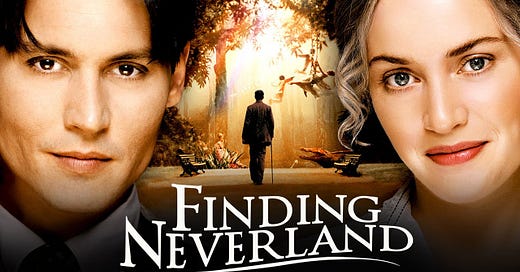I must have been very small when I watched ‘Finding Neverland’ on TV - without subtitles - and even then it had left a profound impact on me.
‘Finding Neverland ' is about searching for a place which is timeless, a place where people don't age, things don't age, and even to die ‘will be an awfully big adventure’. It is a place where we all want to escape too.
You just have to believe that it exists, as J.M Barrie keeps saying.
I know this reads off as a dangerous, illusionary tactic of leading oneself to deny the existence of the real issues. But tell this to a man who has lost his brother as a child and the only way he can console his devastated mother is by keeping the brother’s childhood spirit alive in him. Tell this to the young boys who are growing up penniless and without their father and are on the precipice of losing their mother too. The real world is scary. Finding Neverland can be the only way to survive.
The film is about playwright J. M. Barrie and his relationship with a family who inspired him to create the beloved character of Peter Pan. The film, in turn, is based on a book by Allan Knee called ‘The Man who was Peter Pan’.
James Barrie was already a famous play writer when this story begins - in a Park in London, one fine morning when he meets this family of 4 young boys and their beautiful mother Sylvia. The family is grappling with a recent loss - the father had passed away - and the mother was striving to maintain her dignity as she was managing their circumstances.
The real story may be tinged with controversy, but I choose to believe in the movie's portrayal—the bond that formed between the writer and the children, the love James Barrie developed for Sylvia, and how they inspired each other.
Somewhere after I had first watched the film, I had also attempted to read Peter Pan. I was nearly an adult by then, and it had made me feel sad to think of a boy who does not want to grow up (A lesson - as much as we are told not to read adult content as children, we shouldn't read books meant for children as adults, or we end up reading between the lines just too much).
Peter Pan is essentially a reflection of J.M. Barrie himself, a connection the film subtly emphasizes. While Sylvia’s children matured before their age because of the challenges they were facing, James Barrie could never come to terms with the tragedy of losing his brother. Or perhaps he coped in a different way then we as adults understand. Who knows?
It was James who introduced the concept of make-believe into the family, as Sylvia tells him in the end. His inability of being able to outgrow the innocence of his childhood cost him his marriage - but also brought to life the immortal characters of Peter Pan - the boy who never grew up. Peter Pan is selfish, stubborn and innocent - just like children are. He doesn't want the adventures to end. He doesn't understand that his best friend Wendy is falling in love with him. He does not want to deal with adult existential problems, when he is occupied in fighting evel pirates and thieves with magic.
Falling in love with Slyvia was also perhaps in the same vein for James Barrie - just as he refused to let go of his childhood, Slyvia refused to accept her failing health and the loss her children will have to bear if she dies. Psychologists will say shared trauma, but I think it is the insistence of imagining everything to remain in the state of happiness, love, laughter and adventure that forged their bond.
“When every baby is born, its first laugh becomes a fairy. And everytime a child says, I don’t believe in fairies, there’s a fairy somewhere that falls down dead''. James Barrie writes, in the final act he penned down for Sylvia when she is inching towards her death.
The film is a catharsis - we cry when Sylvia is inching towards her death, and when James brings the adventures of Peter Pan alive into her drawing room.
They do not come together, of course, for as James Barrie crafted the story of Peter Pan, he understood that when he allowed Wendy - Peter Pan’s companion to depart, that we cannot hold time still.
But we can get lost in it - into Neverland - sometimes.



